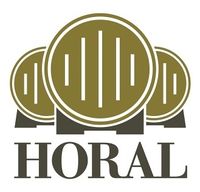HORAL

Overview
HORAL, an acronym for Hoge Raad voor Ambachtelijke Lambikbieren (High Council for Traditional Lambic Beers) is a consortium of lambic brewers and blenders that works together to promote lambic beers, brewing, and culture in Belgium. Their stated goals are "to promote the craft lambic beers and related products, paying attention to the entire process of brewing to serving lambic; denouncing irregularities concerning artisanal lambic beers and related products; take steps to protect the traditional lambic beers and related products".[1] HORAL has worked to obtain and maintain current European Protections on traditional lambic beers since the Traditionally Specialty Guaranteed label was assigned to.[2]
Members
The board members of HORAL mainly consist of brewers and blenders along with other non-brewers.
- Armand Debelder, 3 Fonteinen, chairman
- Frank Boon, Boon
- Gert Christiaens, Oud Beersel
- Joost De Four, De Heeren van Liedekercke, treasurer
- Wim De Kelver, De Lambiekstoempers, secretary
- Paul Girardin, Girardin
- Karel Goddeau, De Cam
- Dirk Lindemans, Lindemans
- Johan Madalijns, De Lambiekstoempers
- John Matthijs, Hanssens
- Yves Panneels, The Gueuze Society, PR & communication
- Pauwel Raes, De Troch
- Bruno Reinders, Mort Subite
- Pierre Tilquin, Tilquin
- Jacques Van Cutsem, Timmermans
History
In January of 1997, at the insistence of 3 Fonteinen's Armand Debelder HORAL formally established themselves with its original members: 3 Fonteinen, Boon, De Cam (then owned by Willem Van Herreweghen), De Troch, Lindemans, and Timmermans. The impetus to creating the group, to promote and protect lambic beers in the face of continued decline, drove the HORAL members to organize the first Toer de Geuze on October 19, 1997. Toer de Geuze has been held every other year since then, with the most recent being in 2013. The most recent addition to the council is Pierrer Tilquin, owner and blender at Gueuzerie Tilquin, who joined in 2012.[3]
Lambic Academy
On December 2, 2014 HORAL sponsored a seminar called the Lambic Academy in which participants could sign up to learn the basics about lambic from its history and ingredients to serving, smelling, and tasting lambic beers. Among the speakers were Armand De Belder of 3 Fonteinen. [4]
HORAL's Stance on Legal Protection of Terms
As a group HORAL's stance on legal protection of terms is concise, though sometimes at odds with the products made by some members of the group. Coincidentally or not, the formation of HORAL and the adoption of the Traditional Specialty Guaranteed (TSG) nomenclature by the European Union is a driving force behind legally protecting the various forms of lambic. The TSG designation puts forth a set rules that include the protection specific lambic-related terms but not necessarily the brewing process itself. The negotiations, which started in 1995 and were spearheaded by Frank Boon (Boon), Jacques Van Cutsem (Timmermans), André De Keersmaeker (Mort Subite) and Jacques De Keersmaeker (Belle-Vue) and concluded in 1997. Today all but Brasserie Belle-Vue are members of HORAL.
Critique of HORAL
Of the eleven brewers and blenders in HORAL, seven make at least one product on a regular basis that would not be considered traditional by some either due to production method or artificially sweetening. Of those seven brewers and blenders, five of them have commercial product portfolios consisting of 50% or more of sweetened lambics (calculated by brand name, not by output volume). This has led to questions of the legitimacy of HORAL as an organized body protecting so-called traditional lambic. If the group continues to recognize brewers and blenders whose product portfolios represent a majority of sweetened or "non-traditonal" products, how can they be a force in maintaining the traditional standards to which they claim to aspire? This question has been addressed publicly on at least one occasion by notable non-HORAL member, Jean Van Roy of Cantillon.
Though it is true that many of the brewers and blenders under the HORAL umbrella do consistently produce sweetened or non-tradtional lambics, all of them produce at least one "traditional" product, if not more. Thus, the stength of HORAL seems to lie in the maintenance of what is traditional vis-à-vis its relationship with the European Union while the members are free to pursue what is in their best interest as a business so long as there is at least a modicum of tradition in their overall product portfolio. Indeed, the HORAL website acknowledges these portfolios of sweetened or non-traditional beers under each brewery's page. Additonally, Avermaete & Vandermosten write that recently "the TSG label has proved its role in safeguarding the identity of specific characteristics in brewing that are not in line with current measures on hygiene and food safety.[2] At the very least, HORAL would seem a unifying voice for the preservation of the Belgian lambic community at large.
Cantillon's Non-Involvement
JEAN VAN ROY BASICALLY TELLS YOU ALL TO FUCK RIGHT OFF
References
- ↑ HORAL - Association, Members, and History, http://www.horal.be/vereniging (Dutch)
- ↑ Jump up to: 2.0 2.1 Tessa Avermaete and Gert Vandermosten, Traditional Belgian Beers
in a Global Market Economy, 2009 Cite error: Invalid
<ref>tag; name "Avermaete&Vandermosten" defined multiple times with different content - ↑ HORAL - Association, Members, and History, http://www.horal.be/vereniging (Dutch)
- ↑ HORAL - Lambic Academy, http://horal.be/lambiek-academie (Dutch)